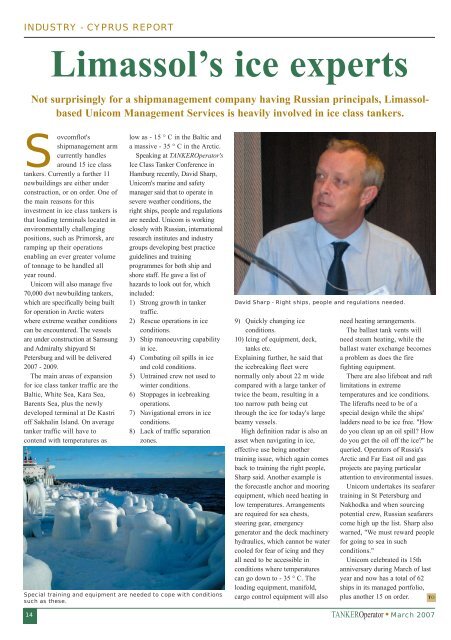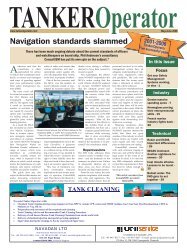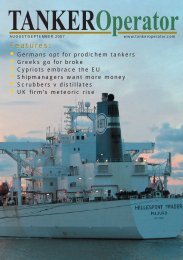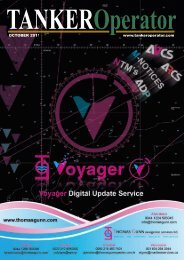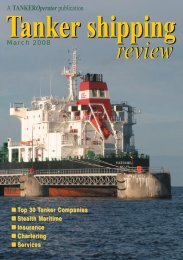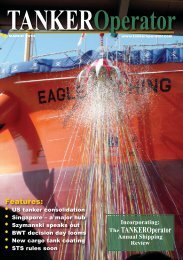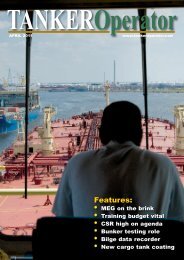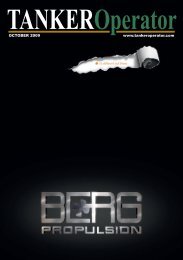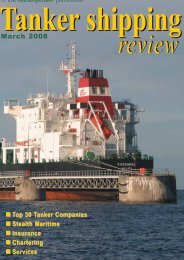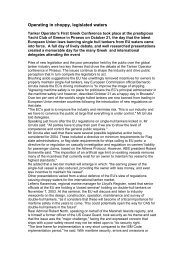Download - Tanker Operator
Download - Tanker Operator
Download - Tanker Operator
You also want an ePaper? Increase the reach of your titles
YUMPU automatically turns print PDFs into web optimized ePapers that Google loves.
INDUSTRY - CYPRUS REPORT<br />
Limassol’s ice experts<br />
Not surprisingly for a shipmanagement company having Russian principals, Limassolbased<br />
Unicom Management Services is heavily involved in ice class tankers.<br />
Sovcomflot's<br />
shipmanagement arm<br />
currently handles<br />
around 15 ice class<br />
tankers. Currently a further 11<br />
newbuildings are either under<br />
construction, or on order. One of<br />
the main reasons for this<br />
investment in ice class tankers is<br />
that loading terminals located in<br />
environmentally challenging<br />
positions, such as Primorsk, are<br />
ramping up their operations<br />
enabling an ever greater volume<br />
of tonnage to be handled all<br />
year round.<br />
Unicom will also manage five<br />
70,000 dwt newbuilding tankers,<br />
which are specifically being built<br />
for operation in Arctic waters<br />
where extreme weather conditions<br />
can be encountered. The vessels<br />
are under construction at Samsung<br />
and Admiralty shipyard St<br />
Petersburg and will be delivered<br />
2007 - 2009.<br />
The main areas of expansion<br />
for ice class tanker traffic are the<br />
Baltic, White Sea, Kara Sea,<br />
Barents Sea, plus the newly<br />
developed terminal at De Kastri<br />
off Sakhalin Island. On average<br />
tanker traffic will have to<br />
contend with temperatures as<br />
14<br />
low as - 15 ° C in the Baltic and<br />
a massive - 35 ° C in the Arctic.<br />
Speaking at TANKER<strong>Operator</strong>'s<br />
Ice Class <strong>Tanker</strong> Conference in<br />
Hamburg recently, David Sharp,<br />
Unicom's marine and safety<br />
manager said that to operate in<br />
severe weather conditions, the<br />
right ships, people and regulations<br />
are needed. Unicom is working<br />
closely with Russian, international<br />
research institutes and industry<br />
groups developing best practice<br />
guidelines and training<br />
programmes for both ship and<br />
shore staff. He gave a list of<br />
hazards to look out for, which<br />
included:<br />
1) Strong growth in tanker<br />
traffic.<br />
2) Rescue operations in ice<br />
conditions.<br />
3) Ship manoeuvring capability<br />
in ice.<br />
4) Combating oil spills in ice<br />
and cold conditions.<br />
5) Untrained crew not used to<br />
winter conditions.<br />
6) Stoppages in icebreaking<br />
operations.<br />
7) Navigational errors in ice<br />
conditions.<br />
8) Lack of traffic separation<br />
zones.<br />
Special training and equipment are needed to cope with conditions<br />
such as these.<br />
David Sharp - Right ships, people and regulations needed.<br />
9) Quickly changing ice<br />
conditions.<br />
10) Icing of equipment, deck,<br />
tanks etc.<br />
Explaining further, he said that<br />
the icebreaking fleet were<br />
normally only about 22 m wide<br />
compared with a large tanker of<br />
twice the beam, resulting in a<br />
too narrow path being cut<br />
through the ice for today's large<br />
beamy vessels.<br />
High definition radar is also an<br />
asset when navigating in ice,<br />
effective use being another<br />
training issue, which again comes<br />
back to training the right people,<br />
Sharp said. Another example is<br />
the forecastle anchor and mooring<br />
equipment, which need heating in<br />
low temperatures. Arrangements<br />
are required for sea chests,<br />
steering gear, emergency<br />
generator and the deck machinery<br />
hydraulics, which cannot be water<br />
cooled for fear of icing and they<br />
all need to be accessible in<br />
conditions where temperatures<br />
can go down to - 35 ° C. The<br />
loading equipment, manifold,<br />
cargo control equipment will also<br />
need heating arrangements.<br />
The ballast tank vents will<br />
need steam heating, while the<br />
ballast water exchange becomes<br />
a problem as does the fire<br />
fighting equipment.<br />
There are also lifeboat and raft<br />
limitations in extreme<br />
temperatures and ice conditions.<br />
The liferafts need to be of a<br />
special design while the ships'<br />
ladders need to be ice free. "How<br />
do you clean up an oil spill? How<br />
do you get the oil off the ice?" he<br />
queried. <strong>Operator</strong>s of Russia's<br />
Arctic and Far East oil and gas<br />
projects are paying particular<br />
attention to environmental issues.<br />
Unicom undertakes its seafarer<br />
training in St Petersburg and<br />
Nakhodka and when sourcing<br />
potential crew, Russian seafarers<br />
come high up the list. Sharp also<br />
warned, "We must reward people<br />
for going to sea in such<br />
conditions."<br />
Unicom celebrated its 15th<br />
anniversary during March of last<br />
year and now has a total of 62<br />
ships in its managed portfolio,<br />
plus another 15 on order. TO<br />
TANKER<strong>Operator</strong> • March 2007


